Search the Community
Showing results for tags 'Dop'.
-
Hi everyone, I'm trying to create a FLIP simulation where a fluid source is split into two parts: a blue top and a red bottom. My goal is to have them physically separate, with the red part falling away from the blue part. However, the fluid stays connected and won't split. Blue source: force attribute set to (0, 0.1, 0) Red source: force attribute set to (0, -9.8, 0) Even with these opposing forces, the drops remain stuck together. How can I achieve physical separation between these two colored regions within the same FLIP solver? I tried various values for surface tension and viscosity. I've attached my HIP file for reference. Thank you! drop_separation.hiplc
-
Has anyone figured out how to use the GasSandForces dop? There are no example files of it on the internet. The closest thing i found is on this forum https://www.sidefx.com/forum/topic/25343/, where it uses the "strain" matrix field at least, but it doesn't use the sand forces. And I found a mention of it in this course https://payhip.com/b/kPATt, but that's outside of my budget. If anyone has any idea how to make the gassandforces work, please let us know. gasSandForces.hip
- 1 reply
-
- gassandforces
- flip
-
(and 3 more)
Tagged with:
-
Hi everyone! I have a problem with exporting the assembled animation to Maya in fbx format The animation of the tower itself was built using this tutorial The main problem with outputting animations in fbx format: -The animations are in the cache and not cached with the keys exposed as I have done before through the SOP of the network -And for some reason the model is broken into separate pieces that were triangulated Maybe someone has encountered a similar problem and can tell you how to solve it Attached screenshots and source of my project
-
Hi guys, I'm trying to understand how the "Gas Field to Particle" DOP works. I've set up a test scene, but it isn't working as expected. Any ideas on how to troubleshoot the issue? Thanks for helping. gas field to particle 01.hip
-
Hello, I'm trying to do a particle morph effect and all I want to do is to have the animated data imported into the pop network. The effect is from a tutorial by Nicolas Donatelli (https://www.youtube.com/watch?v=B4Zz8Erc09E). Morphing works great but only works on a static geometry and I would like the animated data to be imported as well. It probably an easy solution, would be great if someone could figure it out. Attached is my HIP file with animated geo. I've tried the pop attract node which does the job but it can be quite tricky to control. ParticleMorph_WIP_1.hiplc
-
Hi, I'd like to set up a simulation where there's a small container, and half of it will be filled with liquid. The initial state of the liquid should be static, like a cup of water left on the table for a long time. Then I'll introduce a rigid object to collide with the liquid. Sounds simple, right? But what's puzzling me is how to achieve the static state of the water before the impact of the rigid object. I created the container and converted the lower half of its volume into flip particles, then applied gravity. What happened next was that the behavior of the particles at the collision volume junction wasn't as normal as expected. They kept jittering, and as the simulation continued, the jittering became even more intense. Whether it's what I expected or what happens in the real world, the water should become more and more static as time goes by. However, with gravity turned on in the DOPNET, I can't make them completely calm. I found that if I adjust the size of the flip solver volume limits to replace the role of the container and turn on the flip object's closed boundary option, the particles at the boundary junction don't jitter as much. As time passes, the performance of all fluid particles becomes increasingly calm. This is exactly the effect I'm looking for. However, this method only works with cube-shaped containers. If I use a spherical or tubular container, it doesn't solve the problem. So, how can we truly eliminate the jittering of flip particles at the collision volume junction? Below is my .hip file. Thank you all very much. TANKtest.hip
-
Hi, I was wondering how to approach this effect since I tried an approach using particles on a flip solver and on top of that adding a pyro simulation to recreate the mist. But I'm having trouble to achive the "cone" look (attached image) since it keeps spreading and losing power while the particles travel. Thank you for your time and any idea is welcome!
-
Hello dear people of the force. In lops: I have been trying to set up a simulation that takes existing point instances and then modifies them with a dop inside a sopnetwork. I have been looking at the drop node to try and kitbash a solution. I keep on having the problem that it just doesn`t work. I also can`t get modify point instances to work balls_test2.hiplc
-
Hi Houdini friends, Does anyone know how to use mask field in DOP net? I'm doing a simulation of leaves on the ground reacting to a car passing by. I need to control the wind force to affect only where the car is passing, where other leaves remains more still. Is there any way to mask out the affected area and have the wind force only affect that area and have dynamic change on the mask object? Or if there's other ways to do this? Thank you so much!!!
-
I have an AutoDOP Network that I am trying to select for 'heat within object' feature. No matter how much I try to click and select, drag a window around it, it doesn't get selected. What should I do? Sharing a screenrecording of what I face. selection issue.hip
-
Hi, In Dop Network, my Hitters should HIT the ground, but I properly cannot solve this problem, How to fix this, Please ground.hipnc
-
Hey guys ! I'm currently doing a RBD project and I was wondering if you guys had any tips on how I can make my sim more optimised so that it doesn't take 25 min for only 10 inactive frames. The fracture is pretty low res and all the substeps settings are low but the sim is still really slow and practically unworkable. I have 100K pieces correctly named and the building is world scale so i dont know what to do to make it workable, any tips? I would greatly appreciate ! Thank you
- 1 reply
-
- rbd
- destruction
-
(and 3 more)
Tagged with:
-
Hi everyone, I need to switch low res pieces for high res ones. Unfortunately, only for this one object, the transform matrix is empty when coming out of the dop network. The other object coming out has a perfectly working matrix What could be causing this?
-
i tried to have an Attribute value driving a Parameter. It just dont work. I need an Attribute from a Point. dop channel issue.hipnc
-
I am doing a custom force (magnetic like force) in dopnet for a bunch of instanced rigid body objects. The code in my VOP force node loop through other instances and apply forces if any is nearby. I found out my simulation is really inefficient and only utilizes a single CPU core. Is there any way to manually assign each iteration to run in parallel? Or Am I using the right node for the job? I am currently learning Houdini and I am not really fluent in vex.
-
i am trying to use the volume gradient - volume sample method to keep moving particles inside a volume. The particles move freely with a noise but as soon as they reach the edge they should turn. Doesn't seem right so far sdf_bounds.hip
-
Is it possible to access primintrinsics in dops? I have Geometry wich is transformed by a sim. For the second rbd sim i want to make the geometry look at a particular direction. For example to its original direction. So I deleted all Attributes from the first sim to prevent side effects and connected it in to the second sim. To make it look to a direction i want to use the poplookat node (target is direction) in dops. I enabled VEXpression. This is my VEXpression setup: target = {1,0,0}; refdir = v@xdir; up = {0,1,0}; refup = v@ydir; Now i need the original X direction and the Y direction from my Geo. I could convert the primintrinsic "transform" matrix to the directions, but somehow it is not possible to do that in dops. is there any solution?
- 6 replies
-
- primintrinsic
- dop
- (and 4 more)
-
I am working on a pyro sim in which i have cached every frame as a .sim file. These are very large, so ive been researching ways to cache the frames more efficiently. This led me to using the Dop I/O to cache out much smaller .bgeo.sc files. I am aware that this enables me to select which fields i want to omit from the cache, hence the lighter files. The problem im having is that when it comes to rendering (using Redshift fyi), the loaded frame from my .sim looks very different to the loaded frame from my .bgeo.sc, even when i include all the fields from the original DOP network in the cache and it is same size as the equivalent .sim (i presume it contains the same amount of information?) From what i can tell the Dop I/O and the Dop Import are both fetching the same information from the DOP network, so why do they look so different when it comes to render time? Hope all this make sense and i appreciate any responses, cheers!
-
- dop
- simulation
-
(and 2 more)
Tagged with:
-
Can somebody please help me with this surface tension problem. I have a scene and i want a different surface tension to apply to different group as show above. I want the group 1 to have higher surface tension and group 3 to have a lower surface tension but my setup is not working . SurfaceTension.hipnc
-
Hey everyone, so after my very long thread (https://forums.odforce.net/topic/44053-implement-kernel-maths-in-vex/) I finally found a solution. The setup works great at 0.05 res, you might have to dive inside the solver and change some parameters to get it work at other resolutions (especially to get the droplets). Here are some test : Emission threshold at 60 (depending on the situation, there might be some abusive expansion, like at the end on the rubber toy, but this seems impossible to fix when you want a full thin sheet) Stretch threshold at 0.75 / Surface Tension 0.5 Emission threshold at 15 / Stretch threshold at 1.25 / Surface Tension 1 Houdini default Flip with Surface Tension at 1 Crown test with 50 Emission threshold (problem with infinite expansion with liquid dropping from the collider) If someone has suggestion to improve it, feel free to tell me I'm still working on fixing the infinite expansion issue, but the emission threshold is doing great until 20-30 depending on the situation Cheers, thin_sheet_solver.hipnc
- 18 replies
-
- 14
-

-
- fluid
- thin sheet
-
(and 1 more)
Tagged with:
-
I'm working on a POP simulation for a rainy window and I've set up the simulation so that source particles (in yellow) fall with erratic motion due to a varying POP Wind force and Gravity force, emitting a stream of particles behind them (in green) as they fall using POP replicate. The emitted particles are stopped immediately after emission (using the stopped attribute in a POP wrangle). The issue is that as soon as the POP replicate is activated (at frame 200 in the video), the erratic motion of the source particles is lost and they travel more slowly in straight diagonal lines (as the trails of the emitted particles show). I believe that the POP interact node is causing this as the source particles are being attracted to the stationary emitted particles, slowing them down. But what I don't understand is that the POP interact and replicate are in separate particle streams so the emitted particles shouldn't have any effect on the source particles. I've attached a hip file along with a video illustrating the change in motion when POP Replicate is activated. Any help would be much appreciated as I'm pretty stuck on this! Thanks Houdini_POP_Replicate_Question.mp4 POP Replicate Issue.hip
-
Hi all. This should be easy, but it's killing me... I have a control object living outside a DOP network, a simple particle system. I've plugged it into the second input. Inside the DOP I access this control position without issue, in a VOP. However I then want to follow up by killing particles in a POP wrangle, based on distance to the control object... Easy right? Here's my vex: f@dist = distance(@P, v@opinput0_P); if ( @dist <= ch("threshold")) { removepoint(0,@ptnum);} ... simple. But it kills particles around the origin, not the control object, as if v@opinput0_P = {0,0,0} I've tried multiple variants on opinput, explicit path and the point function etc but it always gives me a "kill" radius around the origin, not the control object. Anyone see what I'm missing? Thanks in advance!
-
Would the deformation of texture maps work DOP networks?
- 1 reply
-
- textures
- deformation
-
(and 2 more)
Tagged with:





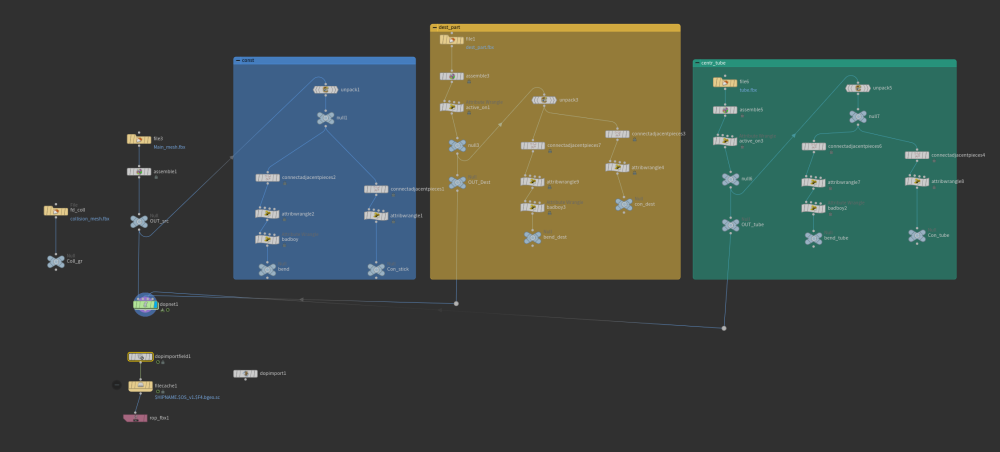
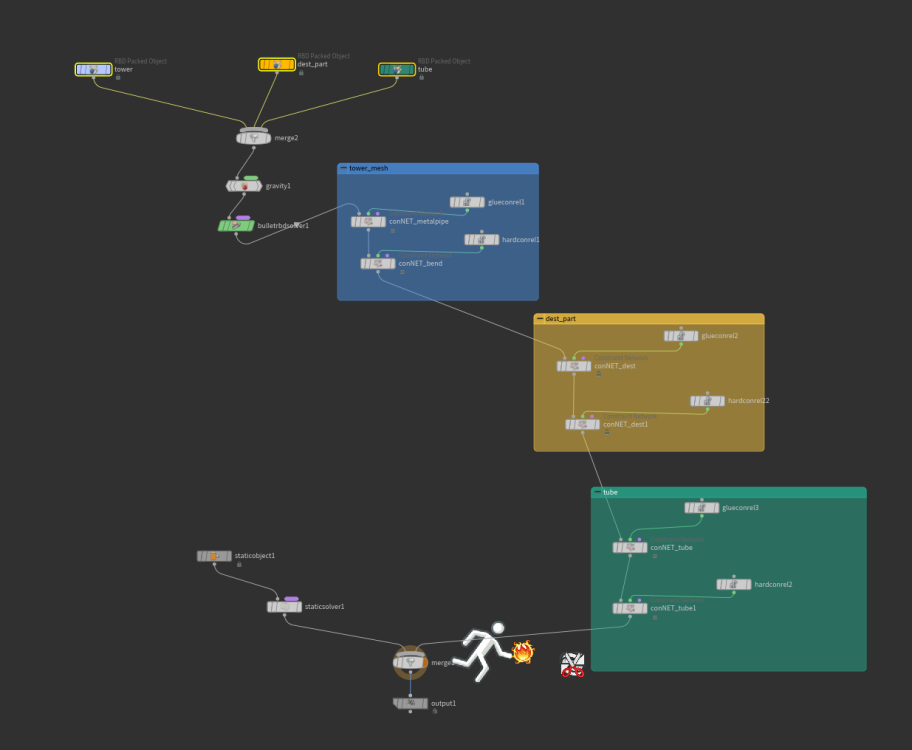

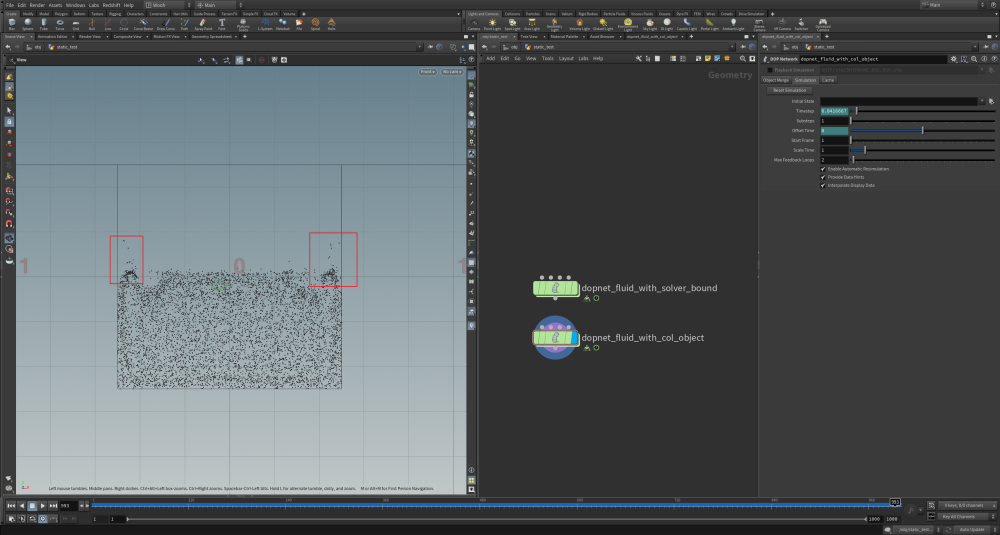
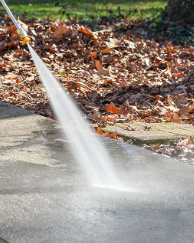
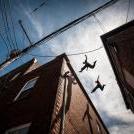



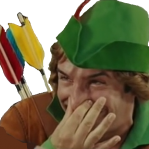
.gif.4350d7bb94eadd0e4401eda1aa4934d5.gif)
.gif.5f966cfe30a2bb5020716adddd4e5e46.gif)
.gif.fdf49d2ea60c82a14f163f9410b95649.gif)


